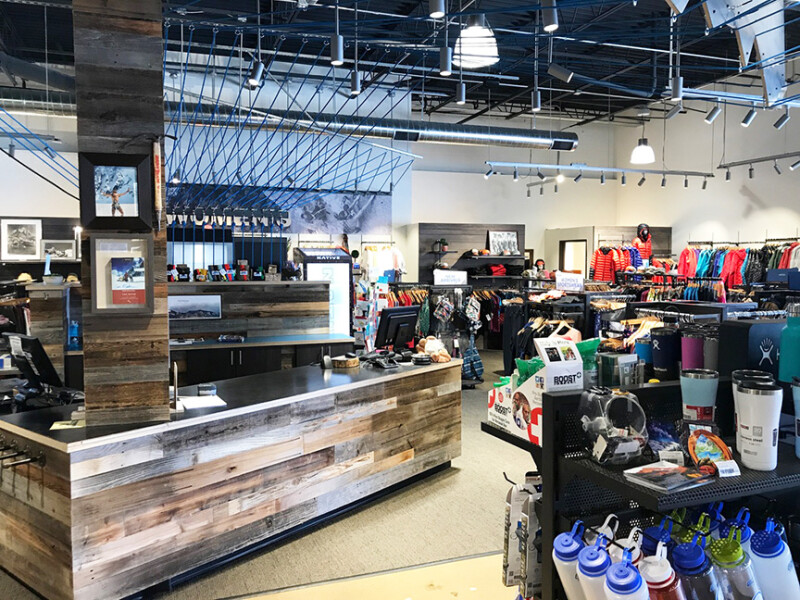Looking for some insight into how run specialty retailers are adapting to new technology in their stores, Running Insight turned to some of the leading technology product and service companies for a special virtual roundtable discussion on what brings together the worlds of technology and the personal touch that makes run specialty special. These men and women – who, naturally, were interviewed using email – provide some insight into the pressing issues facing retailers, how technology can help solve them and thoughts on where we are all headed from here.
Sitting around the table...
- Jennifer Hazard, Director of Sales, Fitted, Inc.
- Ana Wight, General Manager, Retail, Lightspeed Commerce
- Kody Fitzjerrells, President and Founder, Omni Digital Group
- Lance Muzslay, Founder and CEO, Optio
- Rob Anderson, Chief Operating Officer, Run Free Project
How would you rate run specialty in its progress in integrating new technology into their businesses?
Lance Muzslay: I find that most retailers are eager to adopt new technology that will empower them to operate more efficiently. However, sometimes the hurdle to moving forward is finding the time to get comfortable with a new process. Many people are spread so thin that they don’t feel they have adequate time to learn something new. It’s surprising just how much data is involved in operating a run specialty store. Buying decisions are often derived through some combination of spreadsheets after exporting data from the POS system. Such a scenario is precisely what software can greatly streamline.
Rob Anderson: First, I think we can all safely say that as an industry we were a bit late to the technology adoption table. There’s nothing wrong with that — it’s an industry built on the in-person experience, so it makes sense. But in 2020, everything changed. The industry certainly changed and so did consumer behavior. My wife and I never had our groceries delivered to our house using an app before the pandemic. We didn’t even know that was a thing, but now that’s how we get the majority our food. We’re not alone either. Consumer behavior everywhere in every industry trended much further into the digital experience in the wake of the pandemic and all signs point to a reality where we’re never going back. Meanwhile, run specialty retailers understand this change is taking place and although most have a love/hate relationship with technology, the successful ones have leaned into their discomfort and tried new things. This industry-wide change has had a steep learning curve, but when approached with patience and open-mindedness it consistently pays dividends. Getting out of your comfort zone, especially when it comes to running your business, is risky and difficult. We’ve seen almost everyone in our industry do exactly that — recognizing technology as a necessity for survival, taking risks, learning and evolving their approaches over time. And for that, I rate run specialty 9/10.
Jennifer Hazard: The run specialty sector is a fantastic group of forward-thinking business owners. With every new technology we have brought to the table, the run specialty retailers are open to new processes and always adding ways to improve. We use the run specialty segment as a sounding board because they truly understand the need to move forward to improve process and profitability.
Ana Wight: Retailers are leveraging omnichannel solutions to develop a strong, unified presence both online and in-store. Our most recent State of Retail report found that 61 percent of omnichannel merchants in the U.S., 58 percent in the UK and 56 percent in Canada reported higher year-over-year sales growth than their solely e-commerce or brick-and-mortar peers. Adopting technology to better manage inventory, manage supply chain, supplier orders and invoicing, as well as leveraging social media to connect with more consumers and increase sales, are a few of the popular ways that retailers are incorporating technology into their day-to-day business.
Kody Fitzgerrells: If I had to give it a grade, I would say 8 out of 10 because from what I can see there are a lot of advancements regarding POS systems, e-commerce platforms, marketing, etc. The area where it is lagging is more out of a place of not knowing how run specialty uses technology to scale its business and internal systems — items such as training, processes and procedures. I know so many businesses struggle with this and would encourage run specialty retailers to try and get this right.
What advice do you have for retailers who are perhaps a bit hesitant to turn to new technology?
Hazard: Where would we all be if we were still trying to run in Chuck Taylors? Technology should not be feared or loathed. At times change can be overwhelming, but a good tech partner will always be there to help educate and reduce the lift it takes to utilize their products.
Fitzgerrells: I would tell retailers that the taxi driver in New York City wishes he would have advanced a little more in the last 10 years with the advent of Uber. That’s tongue-in-cheek, but it is the truth. If you will advance and compete with bigger retailers with deep pockets, you must do things differently. Smaller retailers can be more nimble than bigger companies, but to innovate rapidly you can’t be in love with how you’ve always done things. You have to try, fail and adjust your way forward. I suggest constantly testing things out until you find a successful recipe and keep that going for as long as you feel it is relevant.
Muzslay: Asking the opinions of other stores who already use the prospective technology is an excellent way to find out if the promise is as good as it sounds. Recognize that adopting new technology often incurs a small upfront effort that will be easily exceeded by long-term gains in efficiency in the near future. Consider starting small and try applying the new technology to a single brand or category. That will make your initial commitment small and lower the perceived learning curve.
Wight: The process of implementing new technology for retailers of any size is a daunting task as management is usually involved in the day-to-day operations of the business. My advice would be not to be afraid of it and to embrace the task knowing that once implemented and up and running it will free up more of your time and also help to boost revenue. Change is always hard, but once you get past the learning curve portion of the process the benefits are endless!
Anderson: The best advice is to honestly observe the world around you with an open mind. I talk to retailers every day who aren’t in love with technology, so they project that disdain onto their customers believing everyone else feels the same way. I can tell you with absolute certainty that they’re mistaken. The statistics tell the story better than I can. According to Google, 97 percent of all consumers find local businesses like running stores online. As a result, almost every single prospective customer who walks through your front door for the first time has their first exposure to who you are on your Google Business Profile and your website. When they get there, they look at your e-commerce store to see what they can expect when they visit you and if they like what they see — only then will they come to your physical store and shop with you for the first time. Once that customer shops with you, there’s about a 50 percent chance that they shop with you again. To put it bluntly, every pathway to the modern consumer, from first exposure to repeat purchase, begins and ends with that smart device in your hand. Without embracing technology and understanding how your consumers engage with it, you will disappear as an option for the majority of prospective buyers. This phenomenon will only get stronger as time goes on.
Finally, what do you feel is the future of retail technology in run specialty?
Muzslay: I still see too many laborious processes that are ripe for being tackled by software. Because the run specialty channel is a relatively small niche it hasn’t attracted a lot of interest from sophisticated software companies who don’t perceive enough return for their investment. As the cost and ease of software development improves we’ll see more solutions specific to run specialty. Thanks to interconnectivity between cloud platforms via APIs we will see more synergy between seemingly disparate platforms.
Anderson: The future’s bright. Retailers are embracing technology, they’re understanding how the digital retail landscape differs from the physical one and they’re evolving. Just because the way consumers engage with retailers has shifted towards the digital, it doesn’t mean that people don’t want to shop in-person; it just means the digital world is where they go to decide whether to set foot in your door in the first place. As tech companies in run specialty, we still have work to do to provide a solid foundation for retailers to engage this brave new world. In my opinion, automation, both for convenience and for scale, will be a huge part of our industry’s future.
Wight: Like any retail business, the future lies with increasing automation to create efficiencies across the business. We see a lot of potential in the use of AI in the future of retail tech. There are many uses and applications of AI that will help with inventory, staffing, marketing and even more. As this technology continues to mature we expect to see it used across the entire retail ecosystem.
Fitzgerrells: The future will all revolve around data and how you can use it to grow. Marketing, inventory, customer data, operational data, just overall, we have all this data, but what do we do with it? Those that can see opportunities where others do not will grow and advance. Sift through your data and find pockets of opportunity to grow. When we all carry the same or similar products and have a similar experience in-store/online, what’s left to decide on who gets the sale? Data.
Hazard: Automation, automation, automation! The more tech can help eliminate processes to do day-to-day tasks, the more time retailers will have to fine-tune their craft of being retailers. Our goal is to reduce the day-to-day back office chores and increase time for retailers to present world-class experiences to their customers.
________________
The Elevator Pitch ...
OPTIO
Optio is a suite of software that optimizes buying and inventory management as well as enhances and fills feature gaps in point-of-sale systems. It strikes a balance between automating tedious and laborious tasks while allowing for quick and efficient decision making. Essentially, Optio integrates all relevant inventory and sales data in real time and delivers it in an easy to use and actionable manner for the task at hand.
Besides large time savings in buying and inventory management, Optio empowers significantly higher turn rates, which leads to higher cash flow. For example, if a store that has $500,000 in annual footwear cost of goods sold increases their footwear turn rate from 2.5 to 4.0, they will unlock $75,000 in cash that is otherwise tied up in improperly ordered inventory. Optio is the tool for realizing that kind of improvement coupled with time savings that increase profitability.
The top part of the screenshot exemplifies combining current inventory, past sales and inbound purchase order data across multiple locations and grouped by style and size (Hoka Clifton 2E men in this case). This enables buying decisions to be quickly made. The bottom part shows the PO compose window in which you can see inventory by color and decide which color you would like to order. After composing a PO it can be quickly imported into your POS as well as uploaded to most brands’ B2B sites.
The Elevator Pitch ...
RUN FREE PROJECT
Ninety-seven percent of consumers discover their favorite local businesses online. The Run Free Project ensures your customers are among them. The Run Free Project is a web-based software as a service (SaaS) platform designed for run specialty retailers that acts as the command center for our suite of products. Each integrates seamlessly with the others, and all are managed from a single universal portal residing on the running store’s web domain.
• Website Builder: A content block-based website builder that enables running stores with no coding experience to create and easily update websites.
• Integrated e-commerce: A solution that syncs with the point of sale (POS) system, automating inventory, orders, gift cards and customer records. When new products are added into the POS, they are automatically added to the e-commerce store, pulling in pictures and a description from the crowdsourced Run Free Project Metabase. Plus, the platform automates social media marketplaces, integrates with 50-plus third party solutions and offers run specialty customers an endless aisle of products with Relay, which provides running stores with access to top brands’ warehouse inventories at no extra charge.
• Mobile Loyalty Apps: Run specialty retailers’ customers can have an immersive experience with their running store’s custom-branded mobile app on Apple and Android devices. Rewards for in-store and online purchases are tracked and redeemed in-app, as are event registrations and check-ins.
LIGHTSPEED
Lightspeed’s one-stop commerce platform helps merchants innovate to simplify, scale and provide customer experiences. Lightspeed’s cloud commerce solution transforms and unifies online and physical operations, multichannel sales, expansion to new locations, global payments, financial solutions and connection to supplier networks.
Since January of 2020, Lightspeed has been working to develop the industry’s most comprehensive end-to-end commerce solution for merchants of all sizes. Since 2005, the needs of its customers have remained a core focus in how they innovate alongside the changing shopping habits of the population. Their technology is continuously evolving to meet the demands of their customers. They also support many third-party apps through their app ecosystem, partner channels and API integrations.
The Elevator Pitch ...
OMNI DIGITAL GROUP
Omni Digital Group specializes in helping 100-plus shoe retailers leverage POS data on platforms such as Facebook, Instagram, email and text marketing. In a world where the largest DTC companies leverage data very well, and some have exploded in sales, a smaller retailer must figure out smart ways to use POS data, such as targeting people on Facebook who have bought from you before or seeing a text message to a former customer who has not been back to your store in 12 months. Omni specializes in helping retailers track which brand was bought in-store as the result of a Facebook purchase, helping work with brands to receive co-op money or, in general, provide better reporting for these brands to help grow a business.






